Are you looking to fine-tune your vehicle’s engine performance and ensure optimal fuel delivery? DTS Monaco offers powerful capabilities for diagnostics, including checking fuel injector balance and performance. In this comprehensive guide from DTS-MONACO.EDU.VN, we’ll explore how to leverage DTS Monaco to monitor misfires and potentially use specific routines for in-depth analysis. This knowledge will help you gain a competitive edge in car coding.
Contents
- 1. What Is DTS Monaco and Why Use It for Fuel Injector Analysis?
- 2. Understanding Fuel Injector Balance and Performance
- 3. Identifying the Need to Check Fuel Injector Balance
- 4. Essential Tools and Equipment
- 5. Step-by-Step Guide: Checking Fuel Injector Balance with DTS Monaco
- 5.1. Connect to the Vehicle
- 5.2. Access Live Data
- 5.3. Monitor Misfire Counts
- 5.4. Analyze Fuel Injector Parameters
- 5.5. Perform Injector Tests (If Available)
- 5.6. Interpret the Results
- 6. Advanced Techniques and Routines
- 6.1. Creating Custom Diagnostic Routines
- 6.2. Injector Coding and Adaptation Reset
- 6.3. Analyzing Waveforms with an Oscilloscope
- 7. Safety Precautions
- 8. Common Issues and Troubleshooting
- 9. Benefits of Using DTS-MONACO.EDU.VN
- 10. FAQs about DTS Monaco and Fuel Injector Analysis
- 10.1. Can DTS Monaco code fuel injectors?
- 10.2. Can I use DTS Monaco to perform a cylinder balance test?
- 10.3. Is DTS Monaco easy to learn for beginners?
- 10.4. What is the difference between DTS Monaco and XENTRY?
- 10.5. Can I damage my car using DTS Monaco?
- 10.6. Does DTS Monaco work on all car brands?
- 10.7. How often should I check my fuel injector balance?
- 10.8. What causes fuel injectors to become unbalanced?
- 10.9. Can I clean fuel injectors myself?
- 10.10. Where can I find reliable DTS Monaco training in the USA?
- Conclusion
1. What Is DTS Monaco and Why Use It for Fuel Injector Analysis?
DTS Monaco (Diagnostic Tool Set for Monaco) is a powerful diagnostic and engineering software used primarily by automotive engineers and technicians. Its advanced capabilities make it suitable for in-depth analysis of vehicle systems, including the fuel injection system. It is the go-to tool for car coding.
- Comprehensive Diagnostics: DTS Monaco provides access to a vehicle’s electronic control units (ECUs), allowing you to read diagnostic trouble codes (DTCs), access live data, and perform various tests and routines.
- Injector Performance Evaluation: With DTS Monaco, you can monitor individual fuel injector parameters, such as injection duration, fuel pressure, and adaptation values.
- Misfire Detection and Analysis: DTS Monaco allows you to monitor misfire counts for each cylinder, helping you identify potential issues with fuel injectors or other engine components.
- Advanced Functionality: Beyond basic diagnostics, DTS Monaco enables you to perform advanced functions like injector coding, adaptation resets, and even custom routines for specific troubleshooting scenarios.
2. Understanding Fuel Injector Balance and Performance
Fuel injector balance refers to the consistency of fuel delivery across all cylinders in an engine. Optimal fuel injector performance is crucial for:
- Smooth Engine Operation: Balanced fuel delivery ensures that each cylinder receives the correct amount of fuel for efficient combustion, resulting in a smooth and stable engine idle and acceleration.
- Optimal Fuel Efficiency: When fuel injectors are properly balanced, the engine operates at its peak efficiency, minimizing fuel consumption and reducing emissions.
- Reduced Emissions: Balanced fuel delivery contributes to cleaner combustion, reducing harmful emissions such as hydrocarbons (HC), carbon monoxide (CO), and nitrogen oxides (NOx).
- Preventing Engine Damage: Imbalanced fuel delivery can lead to cylinder misfires, detonation (knocking), and potentially severe engine damage over time.
3. Identifying the Need to Check Fuel Injector Balance
Several symptoms can indicate the need to check fuel injector balance and performance:
- Rough Idle: An uneven or unstable idle can be a sign of one or more fuel injectors not delivering the correct amount of fuel.
- Misfires: Misfires occur when one or more cylinders fail to combust the air-fuel mixture properly. This can be caused by faulty fuel injectors.
- Poor Fuel Economy: A sudden or gradual decrease in fuel economy can indicate that the fuel injectors are not operating efficiently.
- Lack of Power: If the engine feels sluggish or lacks its usual power, it could be due to imbalanced fuel delivery.
- Hesitation or Stumbling: Hesitation or stumbling during acceleration can be caused by fuel injectors that are not responding quickly or delivering the correct amount of fuel.
- Check Engine Light: The check engine light may illuminate with codes related to misfires, fuel trim, or injector performance.
4. Essential Tools and Equipment
Before using DTS Monaco to check fuel injector balance, ensure you have the following:
- DTS Monaco Software: A properly licensed and installed copy of DTS Monaco software on a compatible laptop.
- Vehicle Communication Interface (VCI): A compatible VCI device that allows your laptop to communicate with the vehicle’s ECUs. Common VCIs include those from Actia, I+ME, and Softing.
- Vehicle-Specific Diagnostic Data: The correct diagnostic data files (also known as SMR-D files) for the specific vehicle you are working on. These files contain the necessary information for DTS Monaco to communicate with the vehicle’s ECUs.
- Stable Power Supply: A stable power supply or battery maintainer to prevent voltage drops during the diagnostic session.
- Vehicle Repair Manual: A vehicle-specific repair manual containing information on the fuel injection system and recommended diagnostic procedures.
5. Step-by-Step Guide: Checking Fuel Injector Balance with DTS Monaco
Follow these steps to check fuel injector balance and performance using DTS Monaco:
5.1. Connect to the Vehicle
- Connect the VCI device to the vehicle’s OBD-II port.
- Connect the VCI device to your laptop via USB or Bluetooth.
- Start DTS Monaco software on your laptop.
- Create a new workspace or load an existing one for the specific vehicle you are working on.
- Select the appropriate ECU for the engine management system (e.g., ME, DME, ECM).
5.2. Access Live Data
- Once connected to the ECU, navigate to the “Live Data” or “Actual Values” section within DTS Monaco.
- Search for parameters related to fuel injector performance, such as:
- Injection Duration (ms)
- Fuel Rail Pressure (bar or psi)
- Injector Adaptation Values (%)
- Misfire Counts (per cylinder)
- Fuel Trim Values (Short Term and Long Term)
- Select the desired parameters and add them to the data display.
5.3. Monitor Misfire Counts
- Start the engine and let it idle.
- Observe the misfire counts for each cylinder.
- A consistently high misfire count on a particular cylinder may indicate a problem with the fuel injector, ignition system, or other engine components.
5.4. Analyze Fuel Injector Parameters
- Monitor the injection duration for each cylinder. The values should be relatively consistent across all cylinders. Significant deviations may indicate a faulty injector.
- Check the fuel rail pressure. It should be within the specified range for the vehicle.
- Examine the injector adaptation values. These values represent the ECU’s attempt to compensate for variations in injector performance. Large adaptation values may indicate a problem with the injector.
- Observe the fuel trim values. Fuel trim values indicate the ECU’s adjustments to the overall fuel mixture. Large fuel trim values, especially in conjunction with misfires, can point to fuel injector issues.
5.5. Perform Injector Tests (If Available)
- DTS Monaco may offer specific routines for testing fuel injectors, such as:
- Injector Activation: This test allows you to activate individual injectors to check for proper operation.
- Injector Cut-Off: This test allows you to cut off individual injectors to observe the effect on engine performance.
- Follow the on-screen instructions to perform these tests.
5.6. Interpret the Results
- Based on the data collected and the results of any injector tests, determine if there are any issues with the fuel injectors.
- Consider factors such as:
- Misfire counts
- Injection duration variations
- Adaptation values
- Fuel trim values
- Injector test results
- If you suspect a faulty injector, further testing may be required, such as:
- Injector resistance testing
- Injector spray pattern inspection
- Injector flow testing
6. Advanced Techniques and Routines
DTS Monaco’s flexibility allows for more advanced diagnostic techniques:
6.1. Creating Custom Diagnostic Routines
- DTS Monaco allows you to create custom diagnostic routines by combining different diagnostic services and parameters.
- This can be useful for automating specific injector tests or for monitoring multiple parameters simultaneously.
6.2. Injector Coding and Adaptation Reset
- If you replace one or more fuel injectors, you may need to code the new injectors to the ECU.
- DTS Monaco allows you to perform injector coding, which involves entering the unique serial numbers of the new injectors into the ECU.
- After coding, it may be necessary to perform an adaptation reset to allow the ECU to learn the characteristics of the new injectors.
6.3. Analyzing Waveforms with an Oscilloscope
- For in-depth analysis of injector performance, you can use an oscilloscope to capture the voltage and current waveforms of the injector circuits.
- This can help you identify issues such as:
- Slow injector response
- Weak injector driver signal
- Excessive injector resistance
7. Safety Precautions
When working with DTS Monaco and automotive systems, always follow these safety precautions:
- Work in a Well-Ventilated Area: Ensure adequate ventilation to avoid inhaling harmful fumes.
- Disconnect the Battery: Disconnect the negative battery terminal before working on electrical components.
- Use Proper Grounding: Use proper grounding techniques to prevent static discharge.
- Wear Safety Glasses: Wear safety glasses to protect your eyes from debris.
- Follow Manufacturer’s Instructions: Always follow the vehicle manufacturer’s instructions and safety guidelines.
- Use Caution with Fuel: Exercise caution when working with fuel to avoid spills or fire hazards.
- Ensure a Stable Power Supply: Maintaining a stable power supply is crucial during the diagnostic process. Voltage fluctuations can lead to inaccurate readings or even damage to the vehicle’s electronic components.
8. Common Issues and Troubleshooting
Here are some common issues you may encounter when checking fuel injector balance with DTS Monaco:
- Communication Problems: If you are unable to connect to the ECU, check the VCI device, cables, and software settings. Ensure that the correct diagnostic data files are loaded.
- Inaccurate Data: If the data appears inaccurate or inconsistent, verify that you have selected the correct parameters and that the vehicle is in the appropriate operating condition.
- Software Errors: If you encounter software errors, try restarting DTS Monaco or your laptop. If the problem persists, consult the DTS Monaco documentation or contact technical support.
9. Benefits of Using DTS-MONACO.EDU.VN
When seeking to enhance your skills in car coding and the use of DTS Monaco, DTS-MONACO.EDU.VN stands out as a premier resource. Here’s why:
- Expert Guidance: DTS-MONACO.EDU.VN provides expert guidance on using DTS Monaco for fuel injector analysis and other advanced diagnostic tasks.
- Comprehensive Training: The website offers comprehensive training courses covering various aspects of DTS Monaco, from basic operation to advanced coding and programming.
- Up-to-Date Information: DTS-MONACO.EDU.VN keeps you informed about the latest updates and features of DTS Monaco, as well as industry best practices.
- Practical Examples: The website provides practical examples and case studies to help you apply your knowledge in real-world scenarios.
- Community Support: DTS-MONACO.EDU.VN fosters a community of DTS Monaco users, allowing you to connect with other professionals, share knowledge, and get support.
10. FAQs about DTS Monaco and Fuel Injector Analysis
10.1. Can DTS Monaco code fuel injectors?
Yes, DTS Monaco can code fuel injectors. When replacing fuel injectors, coding ensures the ECU recognizes and properly utilizes the new injectors.
10.2. Can I use DTS Monaco to perform a cylinder balance test?
Yes, DTS Monaco can be used to monitor misfire counts and fuel injector parameters, effectively performing a cylinder balance test.
10.3. Is DTS Monaco easy to learn for beginners?
DTS Monaco has a steep learning curve, especially for beginners. However, with proper training and resources, it can be mastered. DTS-MONACO.EDU.VN offers courses to help beginners get started.
10.4. What is the difference between DTS Monaco and XENTRY?
DTS Monaco is used for engineering and advanced diagnostics, while XENTRY is primarily for dealership-level diagnostics and repair.
10.5. Can I damage my car using DTS Monaco?
Yes, improper use of DTS Monaco can potentially damage your car’s electronic systems. It is essential to have proper training and understanding before using the software.
10.6. Does DTS Monaco work on all car brands?
DTS Monaco is primarily designed for Mercedes-Benz vehicles, but it can be used on other brands with the appropriate diagnostic data files.
10.7. How often should I check my fuel injector balance?
Checking fuel injector balance should be part of regular maintenance, especially if you notice symptoms like rough idling or misfires.
10.8. What causes fuel injectors to become unbalanced?
Fuel injectors can become unbalanced due to wear, deposits, or electrical issues.
10.9. Can I clean fuel injectors myself?
Yes, you can use fuel injector cleaners or have them professionally cleaned. However, cleaning may not always restore balance.
10.10. Where can I find reliable DTS Monaco training in the USA?
DTS-MONACO.EDU.VN provides reliable and comprehensive DTS Monaco training in the USA.
Conclusion
Checking fuel injector balance and performance with DTS Monaco is a powerful way to optimize your vehicle’s engine operation. By following this guide and utilizing the resources available at DTS-MONACO.EDU.VN, you can gain the expertise needed to diagnose and resolve fuel injection issues effectively. Remember to prioritize safety and continuous learning to make the most of this advanced diagnostic tool.
Are you ready to take your car coding skills to the next level? Visit DTS-MONACO.EDU.VN today to explore our comprehensive training courses and unlock the full potential of DTS Monaco. Contact us at Address: 275 N Harrison St, Chandler, AZ 85225, United States. Whatsapp: +1 (641) 206-8880.
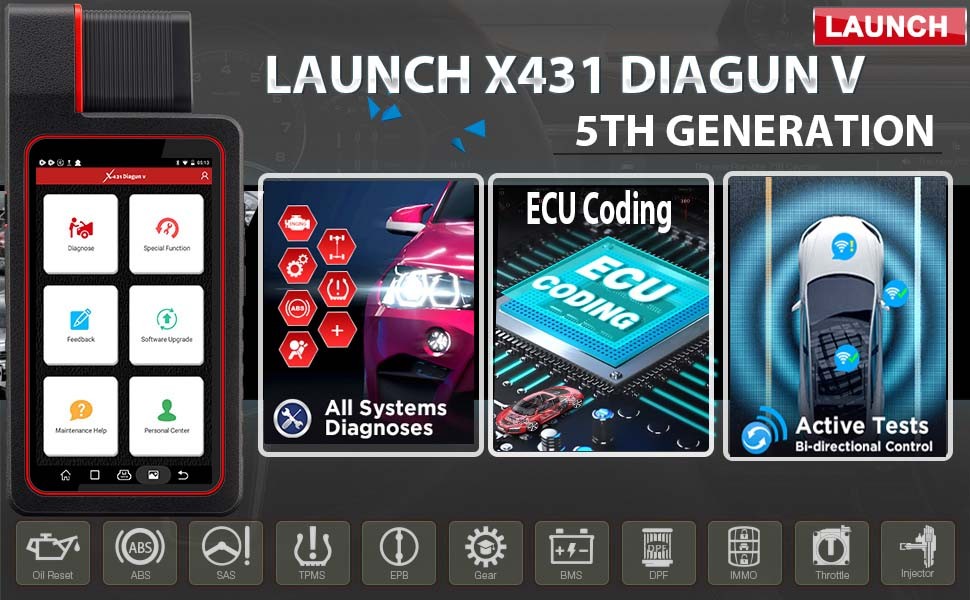 Launch X431 Diagun V Display D1A diagnostic scan tool
Launch X431 Diagun V Display D1A diagnostic scan tool
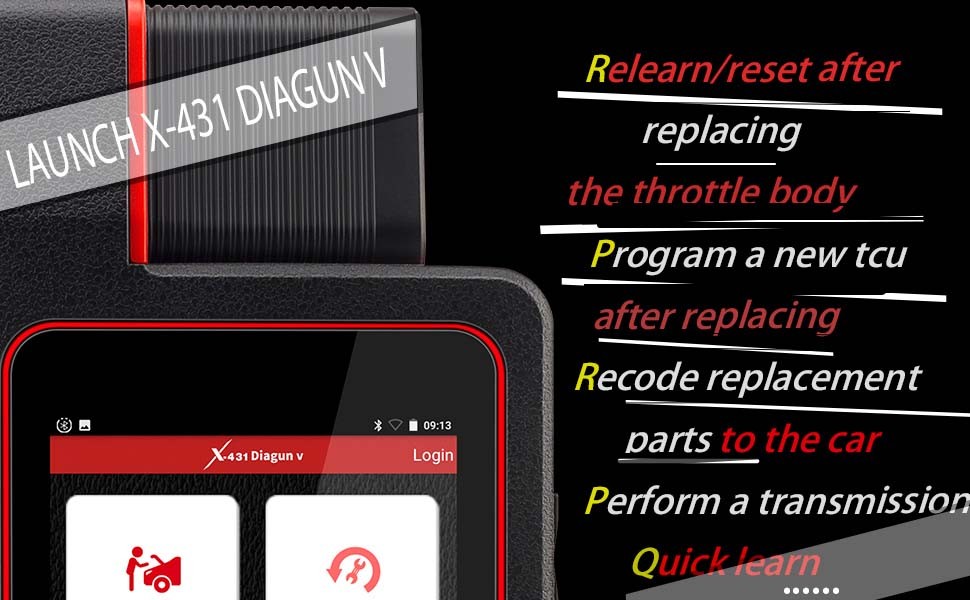 Launch X431 Diagun V Display D2A ECU diagnostic device
Launch X431 Diagun V Display D2A ECU diagnostic device
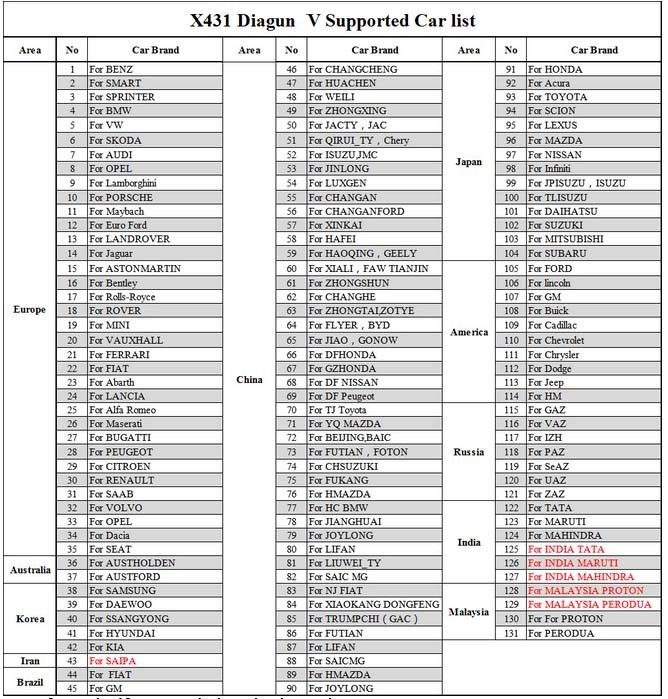 Launch X431 Diagun V Display D3A automotive diagnostic interface
Launch X431 Diagun V Display D3A automotive diagnostic interface
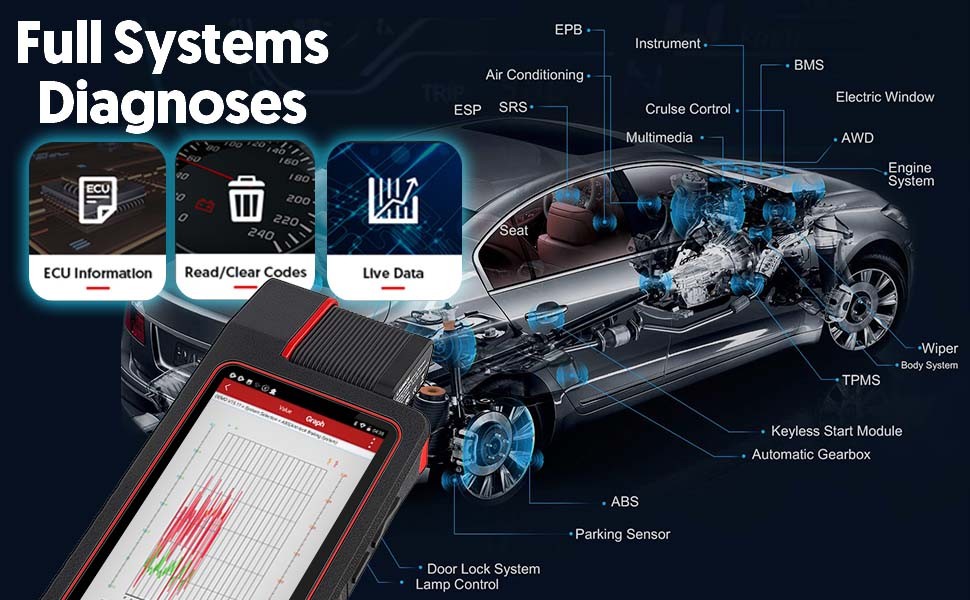 Launch X431 Diagun V Display D4A comprehensive vehicle diagnostic tool
Launch X431 Diagun V Display D4A comprehensive vehicle diagnostic tool
 Launch X431 Diagun V Display D4B diagnostic report data stream playback
Launch X431 Diagun V Display D4B diagnostic report data stream playback
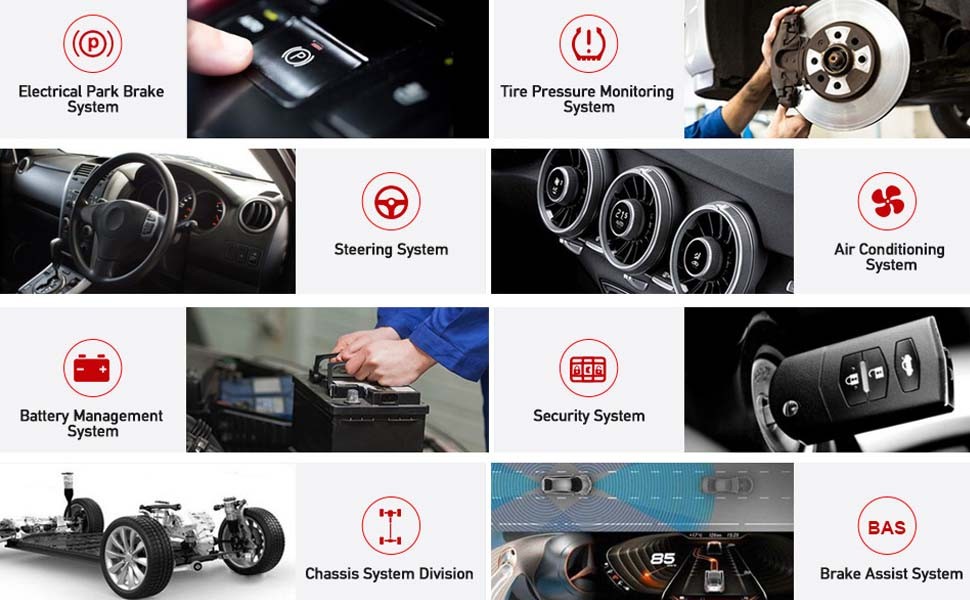 Launch X431 Diagun V Display D4C multi-functional automotive diagnostic device
Launch X431 Diagun V Display D4C multi-functional automotive diagnostic device
 Launch X431 Diagun V Display D5A automotive diagnostic processes
Launch X431 Diagun V Display D5A automotive diagnostic processes
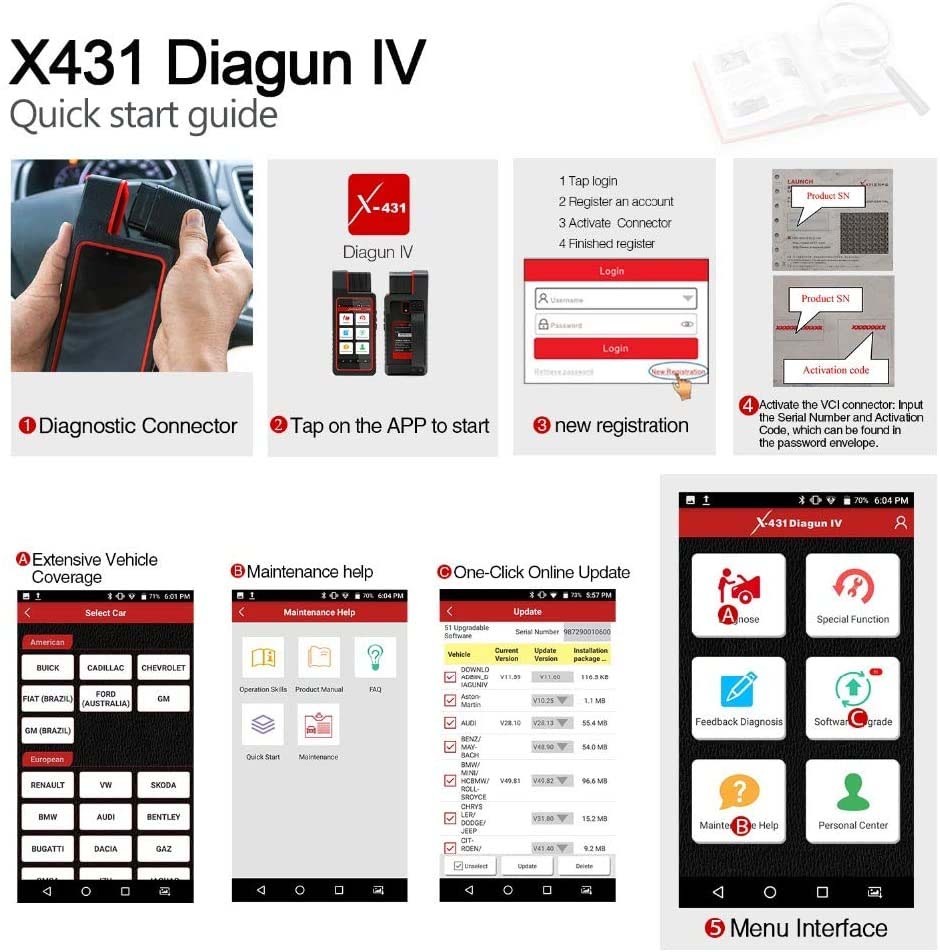 Launch X431 Diagun V Display D6A online repair resources vehicle models
Launch X431 Diagun V Display D6A online repair resources vehicle models